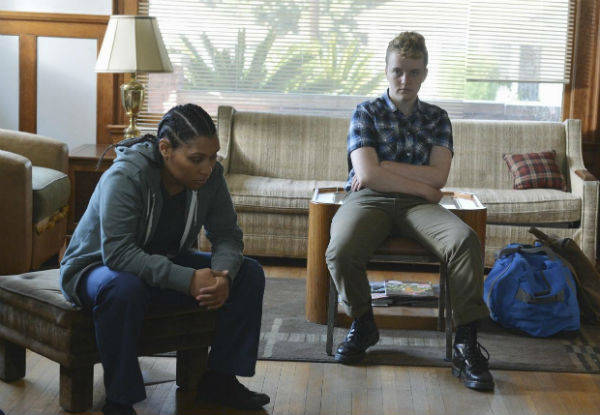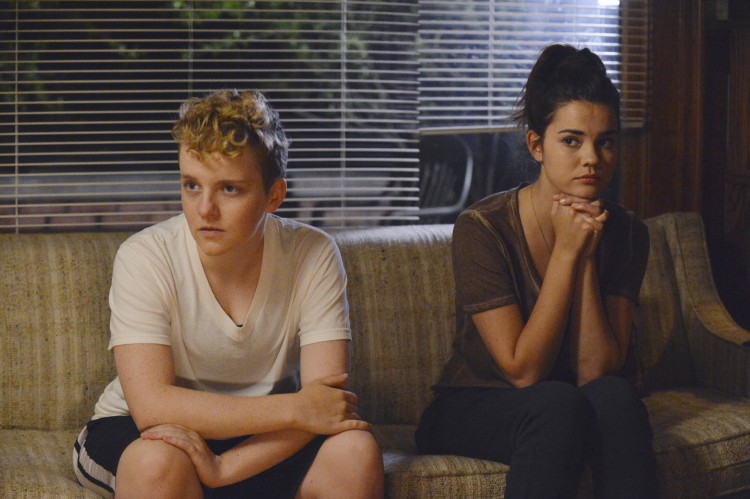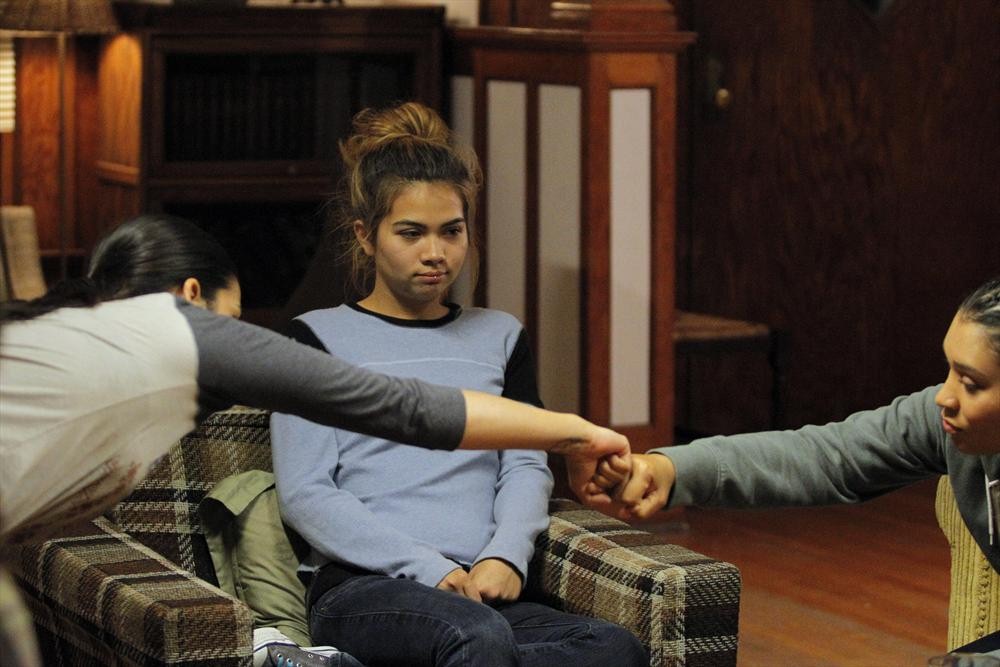With its anticipated first season finale airing March 24th, ABC Family’s hit series has generated a growing fanbase, and for good reason. Posture’s Film Editor, Demi, interviews Tom Phelan and Hayley Kiyoko, who reflect on their characters, insights and experiences working on such an influential show.
“My entire life has been the greatest piece of advice for approaching the character [of Cole]!” – Tom Phelan
For those of you who are unfamiliar with the ABC Family breakout show The Fosters, here is a series that centers on a biracial lesbian couple whose familial clan consists of a biological son, adopted Hispanic twins, and a foster daughter fresh out of juvie. Addressing issues of gay parenting, blended families, adoption, and both the foster care and juvenile delinquent systems, The Fosters indeed took a risk in tackling such progressive topics from multiple frontiers (especially for a family program)—yet the show proved it could hold its own, and it wasn’t long before ABC Family knew they had struck primetime gold. When catering to young audiences, it’s oftentimes easy for a series that centers on the family unit to fall into the traps of sentimental predictability, but The Fosters succeeds in tackling these familiar themes in a way that is bold, fresh, and even moving. These qualities alone allow the show to serve as a cultural milestone — but The Fosters wasn’t finished standing up to the status quo of underrepresentation. If anything, they were just getting started.
Meet Cole, a transgender teenage boy and “juvenile delinquent” who was placed in an all-girls group home for other delinquents. Since this is not the gender he identifies with, you can see how such a placement becomes very problematic. Played by non-binary trans actor Tom Phelan, the character of Cole adds yet another impressive dynamic to a show that already gives voice to minority groups. Plot-wise, Cole’s predicament is such an effectively clever means of shedding light onto issues of gender identity. By casting a trans actor for a trans role, ABC Family has done what few shows (or films) have, and that is to authentically embrace and represent the trans community. It’s become frustratingly common to witness cis actors play trans roles, because at the end of the day there is still a level of impersonal disconnect that can perhaps be insulting when portraying the struggles endured by transgender individuals, such as chest binding and incorrect pronouns. There’s no question that Cole adds a beautiful dimension and personality to the show’s diverse cast and intersecting storylines, but even more significant is the fact that this complex character is being played by such a talented actor as Tom, who has drawn from their own personal experiences and literally brought the character of Cole to life. Tom does more than merely project onscreen the conflicts facing transgender folk: they add a sincere empathy and necessary visibility to the trans and gender queer community, and we can only hope that other networks take notice and follow suit.
Playing alongside Tom as fellow group home resident Gabi, Disney channel alum Hayley Kiyoko embraces the intensity and callousness of her crime-addled cyberbully character. Kiyoko captures the thoughtful cruelty that bullies possess, and she plays Gabi with the precision and ferocity of someone who must rely on their street smarts and cunning devices in order to navigate the troubled waters of being in the system. I had the privilege of interviewing both Hayley and Tom just in time for the show’s winter finale this Monday, and decided to pick their brains on a range of topics, from what it was like working with Rosie O’Donnell, to the lack of queer recognition and authentic trans representation in the media.
[To Haley]:
How did you first land the role of Gabi?
I first auditioned for several different roles before luckily landing the role of Gabi. I initially went in for ‘Cole’ then got called back for ‘Kiara’ and then did a cold read for Carmen. Finally, I got the call that I booked ‘Gabi’ and loved her character. I loved how sassy and stuck up she was.
Relative to your former projects, what was the biggest (and most difficult) transition you had to make when approaching the role of Gabi?
I was mostly concerned with how I was going to come across ‘mean’. I had never played a role that was as devious as Gabi. It was more of a challenge because I am used to playing a role that shows their power externally. But Gabi, she holds all of her power internally and can hurt someone’s feelings with one single word.
On the show, your character plays a cyberbully and robbery thief. Did you have to do any research on those topics—or on the foster care system in general—to prepare for the part?
I started to dissect why most people become bullies in general. I find that the biggest bullies are the most insecure and have major emotional issues. I really focused on her home life and where she was coming from.
To what extent do you personally relate to Gabi’s character?
I will happily say that I am the complete opposite of Gabi. I am always the socialite in groups, wanting people to like me. I related to her by focusing on the people I knew from school that always put people down.
What was it like working with Rosie O’Donnell?
I couldn’t have been more impressed with her professionalism and connection with the cast and crew. Rosie was a sweetheart to everyone on set and really cared about this project. Her passion truly shined through.
On the show, you play alongside Tom Phelan’s character Cole. Did your experience working with them open your eyes to any insight into LGBTQ issues, specifically within the trans community?
I love Tom so much. They always showed up to set with the biggest smile on their face making everyone else smile. Tom is so inspiring and a wonderful role model to the trans community. I can’t imagine the bravery it takes to let go of any negative energy sent their way. It was an empowering experience working with Tom and I am so proud to call them a friend.
What was the most intimidating experience you had on set?
I was very anxious to get the scene where I say some nasty things to Cole over with. I wasn’t looking forward to being mean to ‘Cole’ because it was so against my personal morals. But that is what’s so great about the show The Fosters, they show viewers how to act and how NOT to act.
Will we be seeing more of Gabi in future episodes?
We shall see…
Do you have any upcoming projects you’d like to talk about, or anything you’d like to promote or mention?
I am writing/recording my second EP currently and will be releasing it Summer 2014.
[To Tom]:

What was going through your mind as you were auditioning for the role of Cole?
I was terrified! It was my first real audition, and even though in retrospect I was really ready, I felt like I was going in completely unprepared. I mostly just thought that it would never happen. I thought I was going to have this great audition and then be able to say that I auditioned for the role of a trans kid. I never thought I would actually get it.
How did you prepare for this part, and what was the most helpful piece of advice you received in approaching your character?
Well, in the audition, the casting folks told me that Cole wasn’t as angry as I had imagined him, and that we should really see less of the vitriol that’s behind the wall he’s built around himself. I was letting too much anger into my interpretation, and I think it was a really great note, and it refined my vision of Cole a lot! Honestly though, most of Cole is pulled from my own experiences, so I guess my entire life has been the greatest piece of advice for approaching the character!
As a trans identified individual, you offer such authentic insight into the transgender experience, and one of the reasons your portrayal of Cole is such an important cultural touchstone is because we rarely see trans actors play trans roles in Hollywood. Why do you think this status quo exists?
Well, to be perfectly honest, the cis world has very narrow definitions of what a man is and what a woman is, and the idea that you’re either one or the other, which is just not true. There’s no room for gender deviation in the cis world. Secondly, transmisogyny plays a huge part in the oppression of trans people. Transmisogyny is present in almost every single television show on air right now. It’s become deeply ingrained in our society to the point where it often goes unnoticed. That’s a huge issue, simply because the transmisogyny of the media has caused so much pain and violence for so many trans women and DMAB trans people. The status quo has no real reason to exist, it serves no purpose, and should be dismantled as soon as possible.
On your Tumblr page, you’ve shared your thoughts on how you believe the casting and recognition of Jared Leto in Dallas Buyers Club is “trans misogynistic”. Do you think it’s possible for a cis actor to properly portray a trans individual, or provide a voice to trans issues? Or is such an undertaking offensive and exploitive?
This issue is very complicated, but here’s the gist of it: Jared Leto shouldn’t have been given this role, and the fact that he was sucks. There are so many qualified trans actresses out there who would have given a kickass performance, but the director, who has said some pretty terrible things, didn’t even consider looking into casting trans actors. Trans women deserve representation, and they deserve proper representation, not just stereotypical stories. Jared Leto also said some messed up generalizations about trans people, and, in his Oscar speech, didn’t thank the community he was representing, instead he thanked his… band? It was really disrespectful and altogether rude. However, the whole situation could have been avoided by just casting one of the many many talented trans actresses out there. It’s not a matter of “who’s the best actor for the part,” it’s a matter of “these people need representation, they need people to look up to and see themselves in in the media.”
In terms of trans issues and representation, were there any inaccuracies or misconceptions present in the script?
Not really! The important thing to remember is that Cole’s story is just one story. Trans people all have different stories. There’s not one narrative that’s “right” or “wrong”, they just are. Cole’s narrative follows a story that I’ve heard from many of my friends: born in the wrong body, knew from a young age, and a conventionally masculine presentation. My story is much different from that in that I don’t consider myself born in the wrong body, I didn’t know when I was young, and I don’t present in a conventionally masculine way. There are all types, and no one story can represent every trans person.
Unlike your character Cole who identifies as a transgender young man, you identify as non-binary. To what extent did you draw on your own personal experiences for the role?
I drew a lot on my own experiences with being misgendered and having to justify my identity to those I knew. I’ve never actually gotten into a physical altercation with someone over it but I’ve certainly felt like it!
What is the biggest difference between you and Cole?
Probably the wall that Cole’s built around himself. I have worked very hard to try to keep myself open, and not deny myself the ability to feel anything. He’s also a lot more masculine than I am, and much more physically… what’s the word, intimidating? He tries to take up a lot of space with his body. I’m sorry, this is sounding so actor-y right now!
What was the most difficult or emotional scene for you to shoot? Most vulnerable?
Most difficult was absolutely the scene were Cole gets berated and misgendered constantly by the group in the third episode of the midseason section of episodes. It was rough to shoot, just because it brought up so many memories of my own experiences with that stuff, but I was so lucky to have such a supportive group around me cheering me on.
One of the most significant aspects of Cole’s storyline is how he is forced to stay in a group home for girls—and his experience inspires important discussions about queer recognition, and the potential to transform art into political awareness. What do you hope the public will learn about trans people from your portrayal of Cole?
I hope they’ll learn that we’re not going to stand for just being an afterthought. We are real, and there are lots of us, and we demand to be represented and treated with respect.
Do you have any advice for LGBTQ youth living in the foster care system?
You are loved. You are enough. You can survive anything. You are very, very important, and you’re going to do amazing things.
Do you get self-conscious when watching yourself act on TV? Would you say that you’re a harsh self-critic?
Oh gosh, yes, all the time. I can barely watch myself, honestly! I am a pretty big self-critic, but I think it’s a good thing. It helps to know what I did wrong that time so I can do it right in the future.
What has been the feedback from fans of the show?
Incredible, and so, so positive. All the people who have talked to me have been so kind and wonderful, and I just feel so lucky, and I know that sounds cliché, but I just feel so lucky to have been given this amazing opportunity.
Do you plan on continuing to act in the future? If so, what genre would you most want to work in?
Yes yes yes yes yes! I would like nothing more than to be involved in this whole shebang for the rest of my life. Honestly, it’s always been my dream to be involved in the theatre, but we’ll see what happens!


